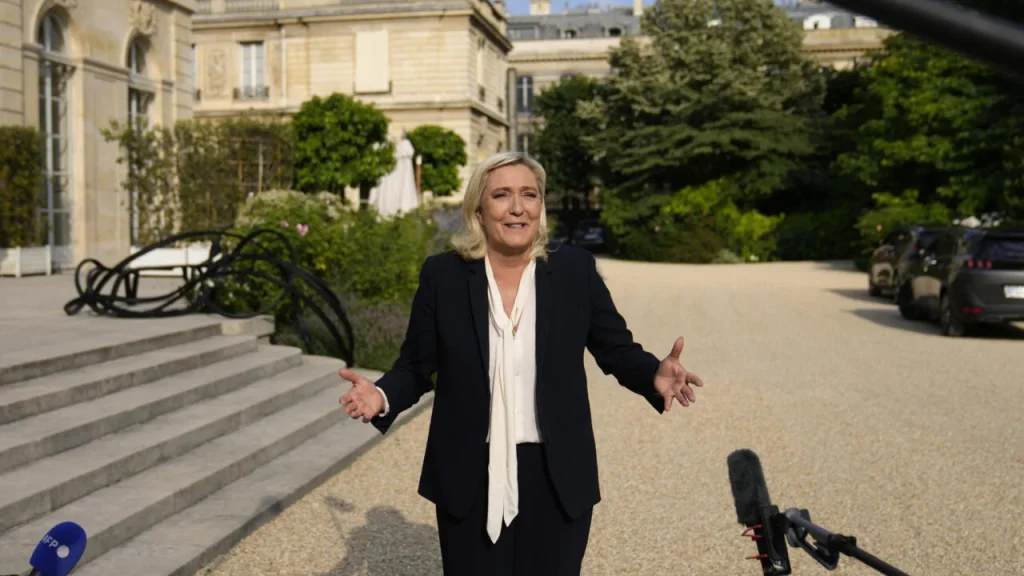In a strategic move to elevate her international presence, Marine Le Pen, leader of France’s National Rally (RN) parliamentary group, embarked on a three-day visit to Senegal on January 16, 2023. This marks her first overseas trip since her defeat in the April 2022 French presidential election. The visit, shrouded in secrecy until her arrival in Dakar, underscores her ambition to reshape her image as a global political figure ahead of the 2027 French presidential race.
A Discreet Diplomatic Mission
Le Pen’s itinerary in Senegal remains closely guarded, with only select media outlets granted access. Her aides have revealed plans for meetings with civil society leaders, business figures, and politicians to discuss critical topics such as economic development, agriculture, food security, and regional stability. While her team insists she will meet Senegalese President Macky Sall, no official confirmation has come from the presidency, leaving room for speculation.
Political analyst Emmanuel Dupuy, president of the Institute for European Perspective and Security Studies, is confident the meeting will occur. “Le Pen wouldn’t risk a high-profile snub by traveling to Senegal without securing a meeting with Sall,” he noted. The choice of Senegal, a stable West African nation with strong historical ties to France, is seen as a calculated step to align with a country that shares cultural and political values, including francophonie and a legacy of Franco-African cooperation.
Strategic Choice of Senegal
Senegal stands out as a beacon of stability in a region marked by recent political upheaval in neighboring countries like Mali, Guinea, and Burkina Faso. With an economic growth rate exceeding 5 percent, Senegal offers a favorable backdrop for Le Pen to project her vision for global partnerships. Dupuy describes her choice as “shrewd,” noting Senegal’s alignment with French values and its role as a key ally of French President Emmanuel Macron. This connection complicates criticism from Macron’s party, as Sall is one of his closest African allies.
In an open letter published in L’Opinion before her trip, Le Pen advocated for stronger North-South relations. She emphasized giving Africa, with its 1.5 billion people, a more prominent role in global organizations. Notably, she expressed support for Senegal securing a permanent seat on the UN Security Council, a bold stance aimed at appealing to African nations while reinforcing her commitment to international diplomacy.
Rebuilding an International Profile
Le Pen’s Senegal visit is a deliberate effort to rebuild her international credentials after her 2022 election loss to Macron. Analysts like Nicolas Beau of Mondeafrique see it as the “start of carving out an international profile.” Her previous international engagement, a 2017 trip to Chad, focused on ending françafrique—the complex web of influence between France and its former colonies—while promoting sovereignty and cooperation in education and agriculture to curb emigration. Similar themes are expected to dominate her discussions in Senegal.
However, Le Pen’s anti-immigration rhetoric, though softer than her father Jean-Marie Le Pen’s, has historically limited her appeal in Africa. Recent anti-French sentiment in West African nations like Mali and Burkina Faso could further challenge her message’s reception. Beau suggests her discourse may face indifference or skepticism, especially given domestic opposition to Sall ahead of Senegal’s 2024 elections.
Timing and Domestic Context
The timing of Le Pen’s trip is notable. Sall, as president of the African Union until February 2023, offers a high-profile platform for her visit. Dupuy points out that traveling to the Comoros, Sall’s successor in the AU presidency, would have been riskier due to tensions involving the French territory of Mayotte. Meanwhile, back in France, widespread protests over pension reforms are escalating, with unions planning strikes on January 19, 2023. Le Pen’s absence during this domestic crisis has drawn criticism, but her team dismisses it, pointing to Macron’s own absence for a bilateral treaty signing in Spain on the same day.
For Le Pen, the Senegal trip allows her to focus on “big political issues,” as Dupuy puts it, while leaving domestic party matters to RN president Jordan Bardella. The visit’s low profile in France, amid domestic unrest, may help it go unnoticed, but it reinforces her intent to position herself as a stateswoman on the global stage.
A Balancing Act
Le Pen’s visit carries inherent risks. While she aims to project a cooperative and respectful image, her far-right platform and past rhetoric could alienate some in Senegal. Sall, however, faces little political cost in hosting her, as she visits in her capacity as an MP and member of the French parliamentary foreign affairs commission. This framing allows Sall to present the meeting as routine diplomatic engagement.
As Le Pen navigates these dynamics, her Senegal trip reflects a broader strategy to redefine her image, strengthen her foreign policy credentials, and lay the groundwork for future electoral ambitions. Whether this visit will resonate with Senegalese audiences or bolster her international stature remains to be seen.






